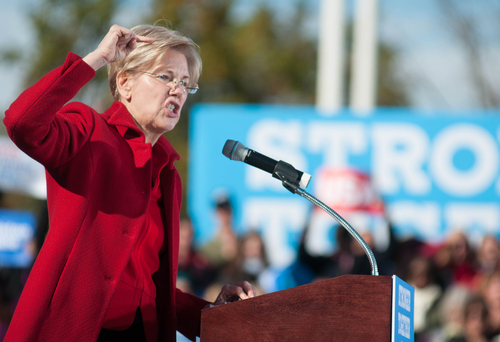Elizabeth Warren’s recent article in Variety has sparked controversy, but not for the reasons you might think.
Warren’s Controversial Article
Elizabeth Warren, the senior U.S. Senator from Massachusetts and a key figure in the progressive movement, recently penned an article for Variety outlining a conspiracy theory involving Stephen Colbert. The piece has attracted significant attention not just for its content but also for what it leaves out, raising questions about the integrity and responsibility of media platforms that publish such views. Warren, known for her academic work and advocacy on consumer protection and economic fairness, ignites another heated debate.
Warren’s omission of important facts has left readers puzzled and critics questioning the motives behind her narrative. While she has been a consistent advocate for economic justice and consumer rights, her latest foray into conspiracy theories contrasts sharply with her established reputation as a serious policy influencer. The article serves as a reminder of the ongoing challenges in media where sensationalism can overshadow substantive discourse.
The Role of Media and Public Figures
The publication of Warren’s article in a major outlet like Variety highlights the complex relationship between media and public figures. As a senior senator and former presidential candidate, Warren’s words carry significant weight. The media’s decision to provide a platform for her unverified claims raises concerns about responsible journalism and the potential influence of high-profile individuals in shaping public opinion, especially when facts are omitted or distorted.
CBS canceled Colbert’s show just THREE DAYS after Colbert called out CBS parent company Paramount for its $16M settlement with Trump – a deal that looks like bribery.
America deserves to know if his show was canceled for political reasons.
Watch and share his message. pic.twitter.com/Rz7HcWFLYM
— Elizabeth Warren (@SenWarren) July 18, 2025
Warren’s engagement with conspiracy theories also underscores the broader cultural and political dynamics at play. With the rise of misinformation and the blurring of lines between fact and opinion in media, public figures have a heightened responsibility to ensure their statements are accurate and evidence-based. The fallout from Warren’s article serves as a case study in the implications of media and political narratives.
Warren’s Progressive Legacy
Despite the controversy, Warren remains a pivotal figure in American politics. Her advocacy for consumer protection and financial regulation has long been a cornerstone of her political identity. She has influenced significant policy debates, pushing the Democratic Party towards more progressive economic stances. Her work with the Consumer Financial Protection Bureau and her opposition to bankruptcy law changes highlight her commitment to economic fairness.
Warren’s recent statements on issues like Wall Street oversight and federal investment in healthcare demonstrate her ongoing influence in shaping policy discussions. However, the contradiction between her policy-driven past and her recent conspiracy-laden article raises questions about her current priorities and the direction of her influence. This duality reflects the broader tension within the Democratic Party between progressive and centrist factions.
Implications for Conservative Values
For conservatives, Warren’s article and its reception offer a clear example of the challenges posed by progressive narratives in media. The omission of critical facts not only undermines journalistic integrity but also complicates efforts to engage in meaningful policy debates. The conservative perspective emphasizes the need for accountability and transparency, particularly when public figures wield significant influence.
Are you sure canceling Stephen Colbert’s show was “purely a financial decision”? pic.twitter.com/nkABVCJGQe
— Elizabeth Warren (@SenWarren) July 23, 2025
The controversy surrounding Warren’s article also highlights the importance of defending constitutional principles and ensuring that media and political discourse remain grounded in truth. As the nation navigates complex issues like economic regulation and consumer protection, the conservative commitment to limited government and individual freedoms remains a vital counterbalance to progressive agendas that often prioritize government intervention over personal responsibility.
Sources:
Encyclopedia of Oklahoma History

